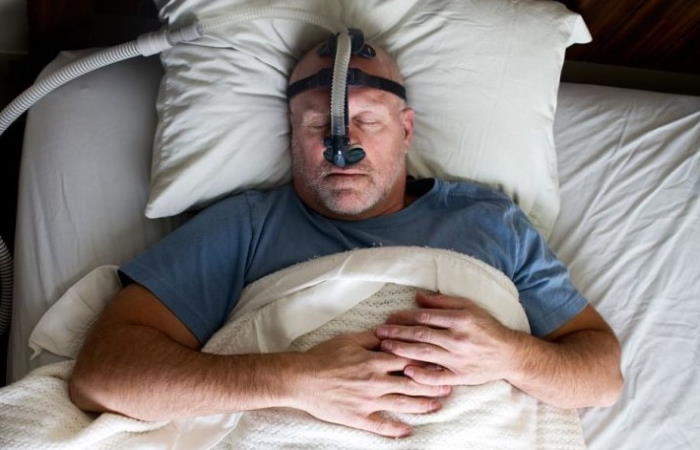While obstructive sleep apnea (OSA) doesn’t seem to discriminate, as it affects people of all shapes and sizes, there seems to be a common denominator in the majority of cases – obesity. But how exactly does obesity lead to sleep apnea? Can you cure snoring by losing weight? Here is everything you need to know about the relationship between sleep apnea and obesity.
The relationship between sleep apnea and obesity
Sleep apnea is characterized by disrupted breathing while sleeping. Affecting more than 22 million Americans, sleep apnea is a highly common sleep disorder in the country. Obstructive Sleep Apnea (OSA), which is the most common type of sleep apnea, happens when the upper airway narrows and blocks the passage of air. Doctors describe it as like breathing through a straw. Those with this disorder may experience about 30 breathing disruptions or more every night. What is more alarming is about 80% of moderate to severe cases of Obstructive Sleep Apnea (OSA) are undiagnosed.
As the world learns more about this disorder, more and more studies show its link to excess body weight. Experts suggest that excess weight cannot only cause sleep apnea; it can worsen its symptoms and intensify all of its negative health effects. Subsequently, inadequate sleep and poor sleep quality may lead to weight gain, making it a vicious cycle of two harmful disorders.
Indeed, there’s a complex interaction between the two conditions. But what exactly is going on?
How excessive weight can lead to sleep apnea
While there are many health conditions that increase the risk of developing OSA, being overweight or obese seem to be the most common. Overweight and obese individuals have more fat deposits in their necks (pharyngeal fat), which block the upper airway during sleep, which is already relaxed. This is why snoring is common among people with excessive weight – their airway is restricting the passage of air, causing a loud noise and disruptions in breathing.
Additionally, fat deposits in the midsection increase abdominal girth. This causes compression in the chest wall, decreasing the volume of the lungs, lowering the lung’s capacity for airflow. As a result, the upper airway is more likely to collapse during sleep.
As one’s Body Mass Index (BMI or the measure of body fat in relation to height and weight) increases, the risk for OSA also increases. Research showed a 10% weight gain increases the risk for sleep apnea up to six-fold.
While sleep apnea can also be found in people with enlarged tonsils that block the airway, endocrine disorders (diabetes, thyroid disease), different anatomical features such as a narrow throat or large neck, and people with heart problems, lung problems, and acid reflux, they are less common. However, about 60-90% of people with sleep apnea are overweight.
How OSA leads to weight gain
While the link between excess weight and sleep apnea has long been established, there’s growing evidence that suggests the relationship between sleep apnea and obesity is actually reciprocal. Experts explain that this is because sleep deprivation and poor sleep quality cause a decrease in leptin (appetite-suppressing hormone) and an increase in ghrelin (appetite-stimulating hormone). Subsequently, insufficient sleep also leads to overeating, which leads to a decrease in fat loss, which leads to obesity.
Another study suggests people with sleep apnea are more susceptible to weight gain compared to people of the same BMI and health status that don’t have sleep apnea. The study showed those who suffer from OSA gained about 16 lbs. more in the year leading up to their sleep apnea diagnosis than those without sleep apnea.
Subsequently, since excessive snoring disrupts the quality of sleep, it disrupts people’s energy levels that are needed to maintain a healthy weight. It increases daytime sleepiness, a common symptom for OSA, which then leads to fragmented and unsatisfying sleep. Excessive daytime sleepiness also leads people to exert less energy through physical activity during their waking hours, which is problematic for overweight and obese individuals.
This is why individuals with excess weight find it difficult to move around and participate in physical activities, since physical effort can cause them to experience more shortness of breath and chest discomfort. Thus, without significant changes in diet, decreased activity levels, which are caused by poor sleep quality, can further cause weight gain due to low levels of energy during the day. Again, a vicious cycle.
Health effects of sleep apnea and obesity
Due to poor quality and lack of sufficient sleep, people suffering from sleep apnea experience stress more significantly and have a higher risk of cardiovascular diseases, pulmonary problems, and metabolic problems.
Sleep apnea and heart health
Sleep apnea affects the heart in many ways. For one, the disruption in breathing lowers the body’s oxygen supply. This triggers the body’s “fight or flight” mode, which increases blood pressure and the heart rate, leading to the abrupt reopening of the airway, which awakens the sleeper. This cycle happens multiple times throughout the night. This cycle of sudden rising and falling of oxygen in the blood can lead to inflammation, which may cause atherosclerosis (the build-up of plaque in the blood vessels). This condition is associated with high blood pressure, heart attack, and stroke.
Since the oxygen level is low, carbon dioxide is high, along with glucose levels in the blood. This disrupts the nervous system, which controls blood flow, heartbeat, and insulin resistance. As a result, people with excess weight and sleep apnea are at higher risk of heart, lung, and metabolic problems, such as:
- Atrial fibrillation and other arrhythmias
- Coronary heart disease
- Metabolic syndrome (obesity, hypertension, diabetes, and dyslipidemia).
- Stroke and transient ischemic attacks (mini-strokes)
- Type 2 diabetes
There is hope
While the vicious cycle of sleep apnea and obesity seems to aggravate each other and worsen both their associated risks, there is hope. Encouragingly, more and more studies support the principle that treating one will yield positive results for the other as well. This means weight loss can significantly improve sleep apnea.
As with other diseases, the effective treatment for sleep apnea and obesity starts with behavioral and lifestyle modifications. This means working towards the ideal and healthy body weight can reduce fatty deposits around the neck, which can contribute to better airflow, and reduce abdominal fat, which improves lung capacity during sleep.
Similarly, losing weight can reduce symptoms related to sleep apnea, such as daytime sleepiness. More importantly, getting to a healthy weight means overall health improvement, especially in cardiovascular health, insulin resistance, high blood pressure, and better quality of life.
Since most obese patients are unlikely or unable to achieve a healthy weight through behavioral modifications alone, doctors may consider pharmacological and/or surgical solutions (medications and/or surgery). Thus, it is always best to start your weight loss journey with your doctor.


























